
Which way now? A new Government could take the outdoor world in a different direction
The last budget day of this parliament has been fixed; the Government will be deciding which important bills will be put into the wash-up period after dissolution, and 646 Westminster MPs will be pondering their future.
The only certainty in all these activities is that there must be a general election by 3 June. So where will the world of outdoor activities stand in the wake of the election.
Britain has changed considerably since Labour swept to power in 1997 and a whole generation has grown up knowing only a Labour administration. That could all change on – the most likely date being touted – 6 May.
The party has listed 50 of what it views as its greatest achievements under first Tony Blair and then Gordon Brown. Understandably, the Good Friday agreement in Northern Ireland, the introduction of the minimum wage and devolution of some power to the Scottish Parliament and Welsh Assembly are touted as prime examples of the changes for the better resulting from a Labour administration.
Curiously, there is only one outdoors issue mentioned: the outlawing of foxhunting. While it may not be at the core of walkers’, climbers’ and mountaineers’ worries when they step out into the British countryside, it is undoubtedly a totemic activity. It would appear that the right of a few moneyed men and women to ride about the countryside willy-nilly, making funny noises accompanied by a pack of dogs intent on ripping to shreds an unfortunate reynard is as important to the soul of the Conservative party as the right of the great unwashed to walk the hills and moors of Britain is to Labour.
And so, it is highly likely that, should the Conservatives gain a large enough majority, they will hold a free vote on the repeal of the Hunting Act 2004. Given that shadow environment secretary Nick Herbert once worked for the British Field Sports Society, which morphed along with two other groups into the Countryside Alliance, and that David Cameron himself has ridden with hunts, it’s hardly surprising that a return of legal hunting with dogs is likely under a Tory government.
So, come a Conservative government in May or whenever, expect the Queen’s Speech to include a legislative two fingers to the oiks and a raised stirrup cup to the reintroduction of foxhunting.
If hunting pinks are central to the old county view of the countryside, then surely the right to roam had as much pedigree among the Left? Which makes the omission of the Countryside and Rights of Way Act 2000 from Labour’s hit parade mysterious. Perhaps it’s a sign of the metrocentric Islington worldview that many say has permeated New Labour’s psyche that one of the most important pieces of outdoor legislation in decades is conspicuous by its absence.
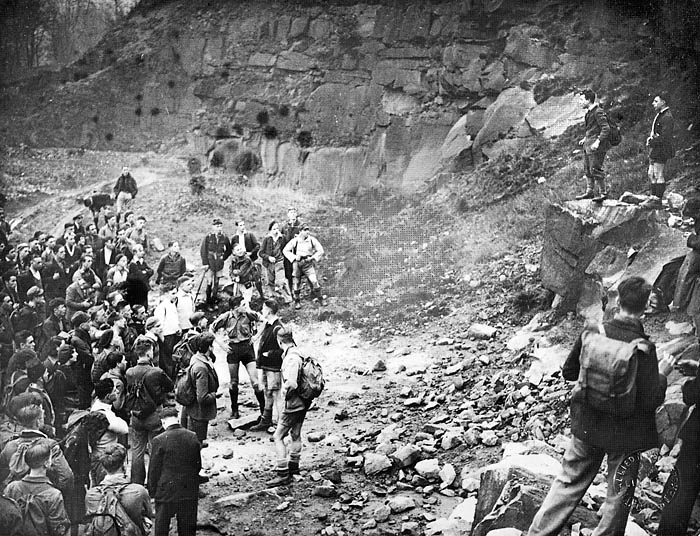
Benny Rothman addresses ramblers at Bowden Bridge quarry before the trespass
Yet access to the mountains and moorlands is, if you’ll pardon the pun, as old as the hills as a lefty’s war cry. Even before the headstrong young Communist Benny Rothman and his co-trespassers took on the Duke of Devonshire’s gamekeeping staff, the proletariat was battling for the right to breathe the clean air on the Peak District hills and the mountains around Glasgow.
Is the right to roam at risk if the Conservatives win the election? I put a few questions to Richard Benyon, the shadow minister for agriculture, fisheries and wildlife. Would the Tories go ahead with the planned review of the areas mapped as open access areas under CRoW? There was an unequivocal ‘yes’ via the minister’s researcher Charlotte Jenner.
Now, that review could, of course, result in a diminution of the right-to-roam areas just as easily as their expansion, but the fact that a Conservative administration would continue the process indicates there is no will immediately to revert to the situation where the only way to access the hills and moors was to stick to the dotted green lines.
So, would a Tory government seek to repeal or alter any sections of the Countryside and Rights of Way Act 2000, in particular the so-called ‘right to roam’ in England and Wales?
“We have no plans to do so,” replied Ms Jenner. Fans of Yes Minister semantics will notice the careful use of language. Having no plans to do so is not the same as not doing it, but the indication is, at least, positive. It’s likely Cameron’s cadre would have bigger fish to fry in its first session, such as wielding the big axe on public spending, whereas Gordon Brown and his (for now) Chancellor have said they would wait a while before the scythe was fully sharpened.
It’s fair to say that the CRoW Act has, by and large, been a success. The predicted desecration of huge swathes of England and Wales’s bucolic splendour has not transpired and apart from a few glitches, the act has simply allowed the adventurous walker and climber – for it is only they, not cyclists, who benefit from the legislation – to leave the beaten track and explore the wilds, or perhaps joins two footpaths to make a more logical excursion.
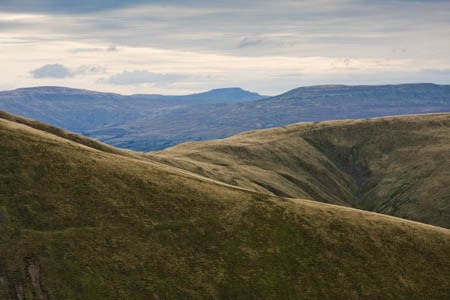
Moorland access: at risk from new trespass laws?
Yet there is a little cloud on the moorland horizon. Mr Cameron has indicated he would introduce a new criminal offence of intentional trespass. Ostensibly, this is aimed at tackling the perceived problem of travellers setting up on land and then proving difficult to move on. Trespass is, largely, a civil tort, but this proposal would land any intentional trespasser with a criminal record. Echoes of Benny Rothman?
Laws have a habit of hitting the wrong target; witness Walter Wolfgang’s ejection and detention from the Labour Party conference in 2005 under the Terrorism Act, or architectural photographer Grant Smith’s search under s44 of the same act for taking pictures of a church. And then there was the notorious use of the Anti-terrorism, Crime and Security Act 2001 to seize the assets of those dangerous insurgents, the Landsbanki Islands.
So let’s suppose Mr A Walker wants to get to that enticing yellow-shaded access land with a grand view at the top. But there’s a problem: that 50m-worth of white-mapped field standing between him and his right to roam. If he crosses it, he’s an intentional trespasser. All it would take is a stroppy landowner and an overenthusiastic plod to set back the rights of walkers 80 years.
The CRoW Act also led to another piece of legislation lauded by countless outdoor groups: the Marine and Coastal Access Act. The result: a proposed coastal corridor round England which walkers could walk and climbers could climb. It’s a massive project, estimated to cost £50m and take 10 years to implement.
Natural England is about to lay before the minister the results of its public consultation on how it goes about setting up the route. The Government’s view is clear, but there is doubt the project will survive a new administration or the public-sector axe.
The Liberal Democrats’ spokesman on outdoor issues Lord Greaves – Tony to his mates – pointed out the precariousness of the English coastal path in January. He said: “The framework is there in the legislation but the implementation will at best take 10 years. The way the project is set up means that it will require the continued commitment of the Government, and sufficient resources for Natural England working with local authorities to bring it about on the ground.
“While we were passing the bill through Parliament the Conservatives sometimes seemed both partial and lukewarm in their support for this part of it. The Ramblers would do well to ask their members to press their local Tory candidates on this matter.
“In addition, a Government looking for billions of pounds of cuts may find this important scheme to be an easy option. A battle has been won but I suspect the campaign for access to our coast is not yet over.”
So we asked what the Conservatives policy was on the coastal path. The reply was: “Conservatives campaigned for a Marine Bill and worked hard to improve the legislation before it became law.
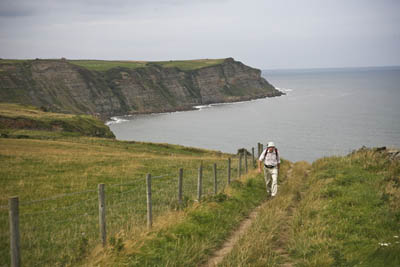
Will coastal access be pursued with the same vigour after the election?
“We recognise the benefits of increased access to the coast of Britain and see the act as a means of making that happen. However, we do have concerns about what certain impacts of the path – in particular spreading room – might have on some rural businesses.
“Many coastal communities have suffered in the recession so the priority for the implementation of any new path should be areas where it will bring the most benefit for tourism and the local economy, with the minimum of disruption.”
Leaving aside the fact that the act concerns only England’s coast and that Scotland’s devolved government has already implemented a far superior coastal access regime, there is that lukewarm feeling to the response. One senses that it will be a long way down Cameron’s list of priorities.
And then there’s a further caveat. Mr Benyon’s spokeswoman told me: “The £50m funding was set out by Defra [the Department for the Environment, Food and Rural Affairs] during the passage of the bill but ministers have given no detail about how this has been budgeted for beyond 2011.
“Any coastal path will need investment but no government can make guarantees of funding over a 10-year period, especially during these difficult economic times.”
Perhaps Lord Greaves had a point.
One other important issue for those who set out into the British countryside is the national mapping agency. Ordnance Survey had a surprise sprung on it in November when Gordon Brown and World Wide Web inventor Tim Berners-Lee said they wanted OS to free its data, including mapping.
Although confused messages blurred the issue, it soon became clear that there was a strong possibility HMG wanted to offer walkers free maps at their favourite scales: 1:25,000 and 1:50,000 – a bonanza that potentially would save keen outdoors enthusiasts a small fortune and, in the process put the cat among the map-retailing pigeons.
The consultation documents give a strong hint that Mr Brown wants to give walkers this Easter gift. The exercise ends in a few days and the Government and OS will have to get its finger out if its wish is to be granted before the election, but it is just possible.
So I again contacted the Conservatives about their attitude to Ordnance Survey.
Which of the three options (or any others) does the Conservative party favour? Reply came there none.
Would the Conservatives put a stop to any outcomes if an election is called before the decisions are implemented, and would it consider reversing these decisions? – Silence.
Does the Conservative party favour full (or part) privatisation of Ordnance Survey? You guessed it; we’ll just have to keep guessing because there was no answer.
What is the Conservative attitude to the Making Public Data Public, including the impact this will have on existing commercial partners of OS, who may be put at a financial disadvantage by these proposals? – OK, that’s enough potshots at an unresponsive shadow minister. Despite repeated requests to Caroline Spelman, shadow Communities and Local Government secretary, we received no reply.
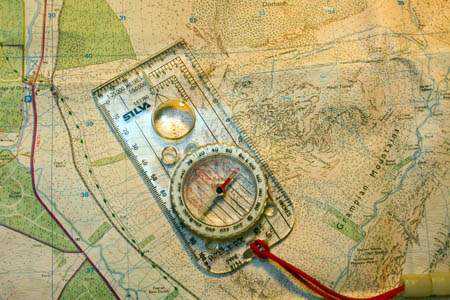
The Conservatives were silent on the future of Ordnance Survey
Perhaps the Tories don’t have any policy towards OS – after all, none of the major parties has yet published its election manifesto. But it’s an important topic for walkers and mountaineers and deserves some attention, not least because quite a few jobs in Southampton could be in the balance.
Mountain rescuers have mounted a vociferous campaign to get tax relief on their vehicles, fuel and equipment, particularly in view of the huge amount of work their volunteers provided during the Cumbria floods and the severe winter, operating well beyond the public’s perceived role of MR as plucking climbers from mountains after they push their luck too far. Westmorland and Lonsdale LibDem MP Tim Farron has done a lot of the running.
Poor briefing of ministers is perhaps behind the obfuscation and Euro-excusing of the issue by Treasury ministers; Tories just don’t seem interested in the issue. Perhaps Alastair Darling could just squeeze in a little Budget gift to the men and women who put themselves into some of the most hazardous situations in the outdoors without question or payment?
This piece has, by necessity, been a little England-centred. The summer election will be for the Westminster Parliament. As mentioned, the laudable Land Reform (Scotland) Act 2003, which gave the country some of the best access legislation in the world was a product of the devolved Holyrood administration and there are no Scottish Parliament or Welsh Assembly elections until next year.
Although Ramblers Scotland’s Dennis Canavan has done his best to make the Beauly-Denny power line a UK issue, arguing that strategic power decisions are a matter for MPs, it is unlikely Cameron, Brown, or any combination of minority or majority government in the Palace of Westminster would intervene in what they see as a largely Scottish issue.
And the same goes for Wales. The British Mountaineering Council is pressing hard for a better deal for the Wales coastal path, but this will be a decision for Cardiff. 2011 is the crucial year for those administrations.
The Countryside Alliance makes a lot of noise for a minority interest and other campaign bodies are lobbying hard. The British Association for Shooting & Conservation has already told its members to quiz parliamentary candidates on shooting and report back their findings.
There doesn’t seem to be a parallel campaign among outdoor enthusiasts. The Ramblers and British Mountaineering Council have a combined membership close to 200,000 and there are many more walkers, fellrunners, climbers, mountaineers, paddlers, mountain bikers and cyclists who carry a vote.
Perhaps it’s time they made some noise too and put outdoor interests into the electoral equation.
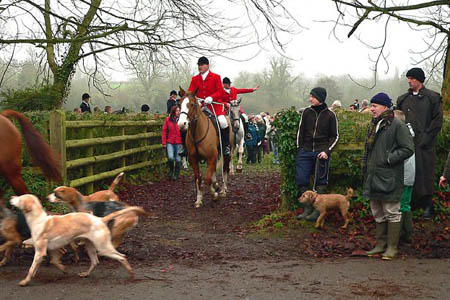
![[CC-2.0]](/lib/img/layout/cc-attr.gif)
Stuart Willis
11 March 2010Really interesting article, Bob - thank you.
It would be interesting to learn also of what attitude the Conservatives have towards the National Parks. Obviously the expected public sector funding cuts will affect the NPs, as really they should, but with issues such as the proposed Lakes/Dales boundary extension ongoing and a great deal of good work that the National Parks do to look after these beautiful areas of countryside, I for one am hoping that any future Conservative government sees the value of the National Parks as much as the present government has.
mhayworth
11 March 2010I suspect the Conservatives will have the same attitude with National Parks as they do with the rest of the countryside. Just an expansion of their killing fields and they don't welcome witnesses to their particular perversions. We certainly know where they stand on the right to roam legislation.
If elected, David Cameron will be the only leader in history to actually reverse a law that protects animals from cruelty.
In fact, if the Tories get into power, this could be the worst year yet for our wildlife. The lines are so blurred between this party and their bloodsports lobbies (the CA and Vote OK), that animals won't have a chance. They've lost my vote and that of many other Tories. With their plans to repeal the hunting act along with the CA's plans to get schoolchildren into the countryside (with an obvious slant on hunting and shooting), we will be reverting back to a dark and barbaric past.
There is no case for repeal. Hunt numbers are up all over the country. Drag hunting is legal. The sense of community, pageantry, heritage, and jobs are all still intact and yet these disgraceful people can’t manage to enjoy themselves unless they are terrifying and killing animals.
If you support the hunting act, please get your names on the R.O.A.R. (Register Online Against Repeal), an ‘all party’ list at: www.campaignfordecency.org.uk
Please make your voices heard!
The Wok Smuggler
12 March 2010I never realised that Grough was edited by Peter Mandelson. i have upto today thought that this was an excellent medium for receiving factual news about the great outdoors but suddenly I find I am reading the most biased and unbalanced piece of "journalism" (I hesitate to dignify the report with that description) that I have seen in a long time. Please get back to doing a proper job of journalism. If I want to read biased tabloid fantasy i will buy a newspaper.
Geoffrey Woollard
12 March 2010"And so, it is highly likely that, should the Conservatives gain a large enough majority, they will hold a free vote on the repeal of the Hunting Act 2004. Given that shadow environment secretary Nick Herbert once worked for the British Field Sports Society, which morphed along with two other groups into the Countryside Alliance, and that David Cameron himself has ridden with hunts, it’s hardly surprising that a return of legal hunting with dogs is likely under a Tory government."
This information needs spreading far and wide, particularly in the country areas, as it tends to undermine the Conservatives' supposed empathy with wildlife, farming and the countryside. I write this as a Cambridgeshire-born farmer who is standing as an independent in South East Cambridgeshire. I was a Conservative councillor and activist and came to realise that the interests of many Conservatives, so far as the countryside is concerned, extend not much further beyond what they can hunt and kill there. Nick Herbert is the prime example.
David Gibson, MCofS
17 March 2010A good piece but lacking in accuracy as far as Scotland is concerned. For example, thanks for forgetting about the Mountaineering Council of Scotland, and the fact that it was the MCofS and not the BMC that campigned for the present access laws in Scotland. Regarding Beauly-Denny, Ramblers Scotland are part of the Beauly-Denny Landscape Group which includes (yes!) MCofS, the Scottish Wild Land group, John Muir Trust, National Trust for Scotland, and the Association for the Protection of Rural Scotland and which continues to campaign against the pylon line. As ever, you overlook the fact that Scottish MRTs are funded by the Scottish government, which thankfully the Conservatives have no chance of ever being part of.
R Webb
17 March 2010The bias is in the reality - there is a deeply polarised difference of opinion between the two potential ruling parties on the subject of land access in England - perhaps one of the few such issues dividing the two main parties.
This site is a news resource for outdoor activities - so it the Conservatives wish to criminalise "trespass" whatever that is - it affects us, it is not bias to report it negatively, because that is what it is.
Your typical rural Conservative supporter (I should know, being brought up in the landowning set) is not sympathetic to us or our activities. They do have the potential, given a majority to hurt us - and remember they have all those Labour new offences and laws in their toybox too. Shades of Benny Rothman indeed. Whatever your political orientation outwith your outdoor activities, be vigilant.